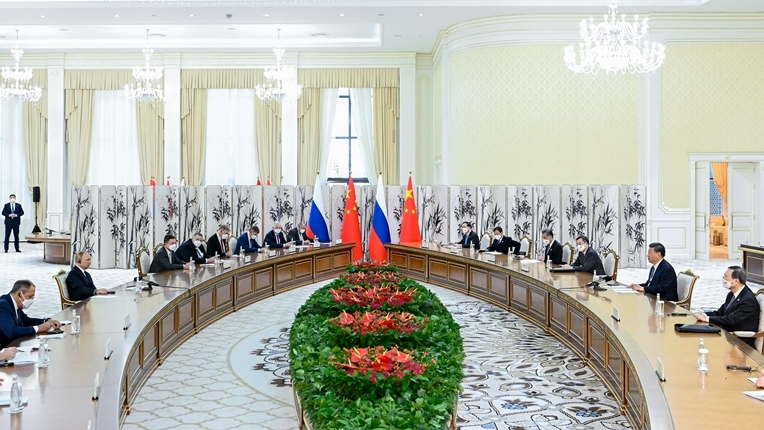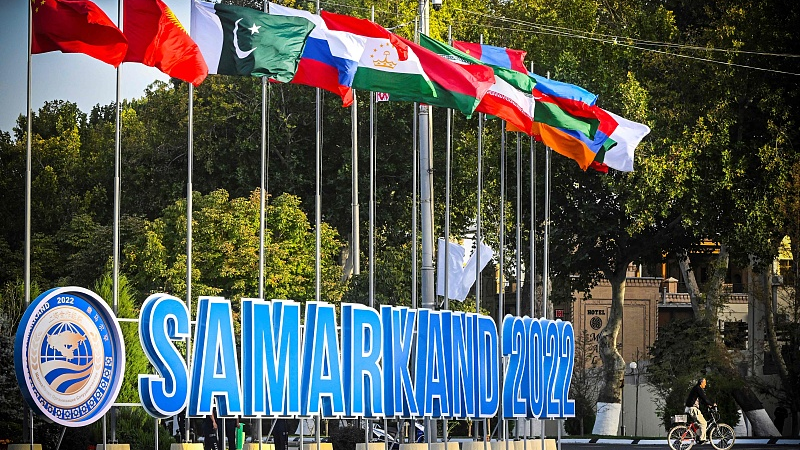
Chinese President Xi Jinping holds talks with Russian President Vladimir Putin in Samarkand, Uzbekistan, September 15, 2022. /Xinhua
Chinese President Xi Jinping holds talks with Russian President Vladimir Putin in Samarkand, Uzbekistan, September 15, 2022. /Xinhua
Editor's note: Vladimir Petrovskiy is a chief research fellow at the Institute of China and Contemporary Asia Studies, and the Russian Academy of Sciences, and full member of the Russian Academy of Military Science. The article reflects the author's opinions, and not necessarily the views of CGTN.
In February of this year, Russian President Vladimir Putin and Chinese President Xi Jinping met at the Winter Olympics in Beijing, but during this time there have been many dramatic events in world politics and economics; but despite this, the leaders of the two countries believe that the friendship between China and Russia, and their relationship of strategic comprehensive partnership remain unchanged and are developing steadily.
On the eve of the upcoming 20th National Congress of the Communist Party of China (CPC), Vladimir Putin wished his Chinese colleague further success in implementing the large-scale plan for the dynamic development of the Chinese nation. Vladimir Putin called Russian-Chinese cooperation a model, and President Xi Jinping agreed, calling his Russian counterpart a "dear and long-time friend."
The parties noted that the foreign policy interaction between Moscow and Beijing plays an important role in ensuring global and regional stability. Russia and China stand together for the formation of a just, democratic and multipolar world order based on international law and the central role of the UN, and not on some rules unilaterally invented by (and for) the West.
President Putin generally stated that "attempts to create a unipolar world have recently taken on an absolutely ugly shape and are absolutely unacceptable for the vast majority of countries on the globe."
Last but not least, this concerns the situation in Ukraine. In fact, it was the U.S. and the West that exacerbated the Ukrainian crisis and provoked Russia into launching a special military operation to protect its vital security interests. In this regard, Vladimir Putin noted China's balanced position on this issue. Moscow appreciates the fact that Beijing deeply understands the origins and root causes of the current events around Ukraine. President Putin expressed understanding of China's questions and concerns in this regard, and he explained in detail Russia's position on this issue.
For his part, Vladimir Putin, during the meeting in Samarkand, reiterated that Russia firmly adheres, not in words but in deeds, to the one-China principle. Putin condemned the provocations of the U.S. and its satellites in the Taiwan Strait.
And this suggests unambiguous parallels around the Ukraine crisis and China's Taiwan question. Of course, their root causes and dynamics are different (which were discussed both in Beijing and in Moscow), but they still have something in common. This is the desire of external forces, primarily in Washington, to interfere in their course in order to provoke the two countries into actions that would serve as a pretext for Western sanctions. Moscow has already been provoked into a military operation, and now they want to do the same with China.
Of course, the leaders of China and Russia also discussed the entire agenda of bilateral relations. Relations between the two countries actively developed in 2021, trade increased by 35 percent and exceeded $140 billion, and in the first seven months of this year, the volume of mutual trade increased by another 25 percent. In the near future, the achievement of the previously set level of annual trade up to $200 billion is expected.

Samarkand, Uzbekistan, September 13, 2022. /CFP
Samarkand, Uzbekistan, September 13, 2022. /CFP
And of course, during the meeting, the two leaders paid special attention to the development of the Shanghai Cooperation Organization (SCO), on the eve of the 22nd meeting of the Council of Heads of State of the SCO. It is important that for the first time after a break of about three years caused by COVID-19, it will be held in person. The leaders of China and Russia stressed the importance of the task of strengthening the SCO in every possible way as a platform for constructive interaction.
After all, the organization includes countries with different cultural and civilizational traditions, foreign policy guidelines and models of national development. But what is important is that building work on the principles of equality and mutual benefit, respect for each other's sovereignty and refusal to interfere in internal affairs made it possible, in a short historical period, to turn this organization into an effective mechanism for multilateral cooperation.
So, the SCO, according to Vladimir Putin, has become the largest regional organization in the world, which has united a vast geographical area and about half of the population of our planet.
In general, the outcome of the meeting of the two leaders accurately characterizes what President Xi Jinping said there: "In the face of the colossal changes of our time on a global scale unprecedented in the history of our time, we are ready with our Russian colleagues to set an example of a responsible world power and play a leading role in order to bring a changing world onto a trajectory of sustainable and positive development."
(If you want to contribute and have specific expertise, please contact us at opinions@cgtn.com. Follow @thouse_opinions on Twitter to discover the latest commentaries on CGTN Opinion Section.)

